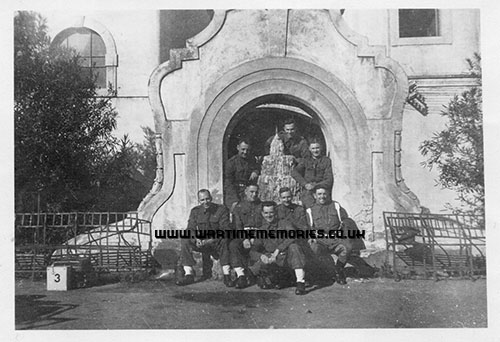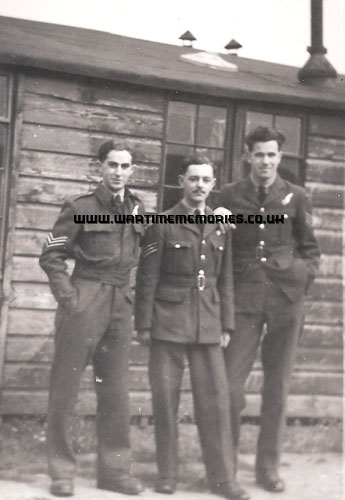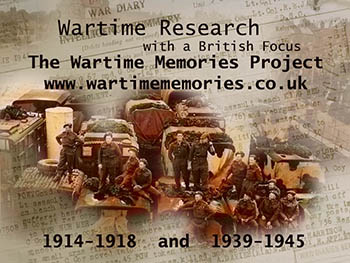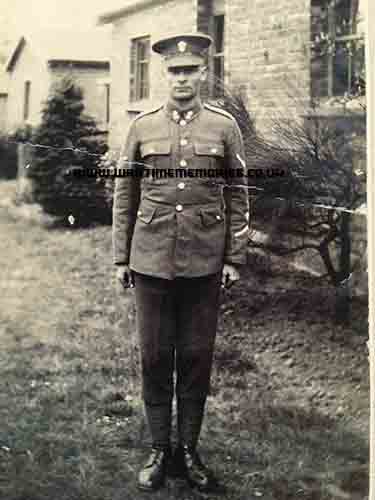|
|
|
Catterick Camp
9th Apr 1940 Orders
27th January 1942 Move 
If you can provide any additional information, especially on actions and locations at specific dates, please add it here.
|
Those known to have served with Catterick Camp during the Second World War 1939-1945. The names on this list have been submitted by relatives, friends, neighbours and others who wish to remember them, if you have any names to add or any recollections or photos of those listed,
please
Add a Name to this List
Records of Catterick Camp from other sources.
|
|
|
The Wartime Memories Project is the original WW1 and WW2 commemoration website.
Announcements

- 1st of September 2024 marks 25 years since the launch of the Wartime Memories Project. Thanks to everyone who has supported us over this time.
- The Wartime Memories Project has been running for 25 years. If you would like to support us, a donation, no matter how small, would be much appreciated, annually we need to raise enough funds to pay for our web hosting and admin or this site will vanish from the web.
- 19th Nov 2024 - Please note we currently have a huge backlog of submitted material, our volunteers are working through this as quickly as possible and all names, stories and photos will be added to the site. If you have already submitted a story to the site and your UID reference number is higher than
264989 your information is still in the queue, please do not resubmit, we are working through them as quickly as possible.
- Looking for help with Family History Research?
Please read our Family History FAQs
- The free to access section of The Wartime Memories Project website is run by volunteers and funded by donations from our visitors. If the information here has been helpful or you have enjoyed reaching the stories please conside making a donation, no matter how small, would be much appreciated, annually we need to raise enough funds to pay for our web hosting or this site will vanish from the web.
If you enjoy this site
please consider making a donation.
Want to find out more about your relative's service? Want to know what life was like during the War? Our
Library contains an ever growing number diary entries, personal letters and other documents, most transcribed into plain text. |
|
Wanted: Digital copies of Group photographs, Scrapbooks, Autograph books, photo albums, newspaper clippings, letters, postcards and ephemera relating to WW2. We would like to obtain digital copies of any documents or photographs relating to WW2 you may have at home. If you have any unwanted
photographs, documents or items from the First or Second World War, please do not destroy them.
The Wartime Memories Project will give them a good home and ensure that they are used for educational purposes. Please get in touch for the postal address, do not sent them to our PO Box as packages are not accepted.
World War 1 One ww1 wwII second 1939 1945 battalion
Did you know? We also have a section on The Great War. and a
Timecapsule to preserve stories from other conflicts for future generations.
|
|
Want to know more about Catterick Camp? There are:3 items tagged Catterick Camp available in our Library There are:3 items tagged Catterick Camp available in our Library 
These include information on officers, regimental histories, letters, diary entries, personal accounts and information about actions during the Second World War. |
|
John Charles Walker Royal Signals My father, John Walker, sent this picture to my mother after meeting her at Catterick in 1943. I am still trying to read my father's and mother's Military Service records and have identified that her A.T.S. record has: AWL 26th May 1943
Dad told a story of being posted to Vienna, Austria and being ordered to destroy enemy communications equipment. He suggested that some more enterprising individuals in his group had actually buried the said equipment, for likely recovery by people unknown.
Dad had always wished to take mum to Vienna, and this was achieved during the mid-1980's, including a visit to an agricultural site where the equipment was thought to be the burial site. The manager of the 1980's site was pleased to meet my father, as the former 1945/46 site manager, who had died during the previous 5 years had often talked of the same story. My father was offered a spade.
|
Sgt. Eric Donald Payne BEM 71st Field Ambulance Royal Army Medical Corps My father, Eric Payne went with the RAMC when they left Catterick Camp for Italy, where he served with the 71st Field Ambulance, which was assigned to the Leicestershire Regiment. He was awarded the British Empire Medal. He passed away in 1995.
|
Cpl. Sydney Harry Hyder Smith 200th Company Military Police  After his call-up, Harry Smith started his training at Maidstone.
His wife was pregnant with their first child at the time and Harry suffered from morning sickness. He claimed this was the only time he saw the RSM laugh.
He was particularly proud of having been subjected to physical training under Stan Cullis, a famous footballer who was highly critical of his football skills.
He was subsequently trained as a driver and dispatch rider at Catterick, Yorkshire. (He was already able to drive having owned his own car before the war.) He was put in charge of a group of 6 who collected newly landed Jeeps from Glasgow and drove them to Liverpool for embarkation to North Africa. On the way south it rained heavily and he had to find a forge where they could drill holes in the floor so they didn't have to drive with their feet in water.
He travelled on a troopship from Liverpool to Algiers. The ship carried six thousand soldiers many of whom including Harry slept on deck. They travelled in convoy far out into the Atlantic before turning back for North Africa in order to avoid U-boats and air attacks but in spite of that, he recalled that several ships blew up and sank, sometimes in the night. The convoy didn't stop.
He landed somewhere around Algiers as part of the 1st Army in Operation Torch). The 1st Army was disbanded after the victory in Tunisia in 1943 after which he was part of the 8th Army.
I am fairly sure that at various times he was in Algiers, Bizerte, Tunis, Tripoli, Benghazi, Tobruk, Sidi Barrani, Mersa Matruh and Alexandria.
He told a story of driving a truck with faulty steering (a broken tie rod) along a stretch of road known as Messerschmidt Alley, because it was straight with desert either side so that German aircraft could easily attack traffic on the road, but because of the steering fault his truck would dart from side to side unexpectedly and so he evaded attack.
He was placed on a train in Mufti to investigate the loss of goods from the train. He found that at one point the track was on a tall curving sand embankment so shaped that although he could see goods rolling down the embankment he could see neither where on the train they were being thrown from nor where they finished up at the bottom of the slope.
He was part of the invasion of Sicily but talked little about this apart from having attended an opera performance in an ancient amphitheatre.
He was landed in Italy, either Anzio or Salerno (probably Salerno). He told of a day when all 30,000 soldiers in the beachhead were told to strip and wash in the sea for lack of other facilities.
He ended the war in Rome and was appointed condottore.
He returned home in about September 1945. For some time after his return he slept on the floor because a bed was too soft.
In North Africa he contracted malaria from which he suffered recurring bouts during my childhood.
|
QMS. James Fahy As QMS father, Jim Fahy said he gave delivery of vehicles to Lord Lovat, leader of the Commandos, whose receipt he took in person.
On a lighter note he claimed that one night in the Officers' Mess, Hubert Gregg performed for the first time a song he had just composed "I'm Gonna Get Lit Up When The Lights Go On In London" which became a big hit.
After Catterick father was posted to the Orkneys.
|
Pte. George Gabbitas Sherwood Rangers George Gabbitas served with 9th Battalion, Sherwood Foreesters in Gallipoli.
He was evacuated as a casualty via Imbros and Mudros. Family anecdote says he suffered frostbite.
He returned to the UK and then transferred to the Durham Light Infantry. He was later discharged as unfit for war service back to the coal industry. He had been a coal hewer (miner) pre war.
In 1923 he enlisted in the Notts Sherwood Rangers Yeomanry and was mobilised with them in 1939 as part of 5th Brigade, 1st Cavalry Division. They went out to Palestine on policing duties to stop trouble between the Arabs and Jews. He returned to UK because of his age and posted to Catterick. Shortly afterwards he was discharged because of his age back to the coal industry. He was awarded the Territorial Efficiency Medal during service with the Yeomanry.
He died in 1961.
|
Sgt. Arthur John Pickering Stamper 7 Squadron  My father, John Stamper was a navigator. Having trained in Florida, USA and at RAF Waterbeach on Wellingtons, he moved on 19th of Februaru 1943 to 1651 Conversion Unit at Waterbeach on Stirlings Mk1, and to new satellite aerodrome at Turweston. Training included night flying. It would appear, that this was training for Pathfinder duties, not standard bombing.
The original crew were Sgt Petrie Pilot from New Zealand,
Sgt Stamper Navigator,
Sgt Rose Bomb Aimer,
Sgt Edmonds Wireless Operator,
Sgt Seery Rear Gunner from Australia
Sgt Hartshorne Flight Engineer and name not remembered of the Mid-upper Gunner.
Total day flying at Waterbeach etc 11 hrs 50 mins, night 1.30 [I think these figures by dad way off as total flying hours in training 194 hr 45 mins. Above it says he did 97 hrs 30 mins at Chipping Norton. This leaves almost 100 hours unaccounted for, which seems a more likely total for training on Stirlings at Waterbeach.
Apparently dad told mum that they were lined up to convert to Lancasters in the near future, presumably with 7 Squadron, this transfer happened in May 1943. Stirlings were generally withdrawn from front-line duties in late 1943.
At some stage in his training dad was involved in testing one of the versions of the Gee radar system, which was upgraded and refined after its introduction in 1941 or 42. Dad told me that on one occasion with some high-level observer(s) on board he had to locate the chapel of King's College very precisely.
On 26th of March 1943, apparently the last day before operational flying was due to start with the Stirlings, the undercarriage collapsed on take off on a dummy bombing run on Hull. Cross-country runs typically preceded operational flying. Dad banged his head badly, and ended up with his feet tangled in the wiring. He performed a difficult, panicked exit from the plane, with the danger of fire.
He suffered headaches and with no flying for six weeks, he was working in the navigation office and saw some sort of personnel file where he'd been recommended for promotion to Pilot Officer. But he had been ticked off by the station Commander for nosing around in his paperwork. It is not known what happened to the recommendation.
The log book suggests he left Waterbeach on 25th of May 1943. In all (according to his maths), he had flown 194 hours 45 mins while training in England.
Then he spent three months in Northfield Military Hospital, Birmingham. Mum remembers him saying that after the crash he was too shaken even to get on a bus as that involved leaving the ground. Northfield was famous for its pioneering psychiatric work on RAF patients in Second World War. Then there was a stint at the War Office Officer Assessment at Catterick, involving assault courses etc.
He didn't feel he had any aptitude for leadership, as he was too young and green, and was still dicky from the crash. He was transferred to Royal Signals and served in the War Rooms under Whitehall, and later at Droitwich, on wireless signalling.
Sgt Petrie, and others from dad's crew, were shot down and killed flying a Pathfinder Lancaster six months later, on night of 16th/17th of December 1943.
|
Lt. Daniel J. R. Thorndike Royal Armoured Corps Daniel Thorndike (nephew of famous actress, Dame Sybil Thorndike), was stationed at Catterick Garrison during WW2. He had suffered an accident with a motorbike and was unfit for front line duty, so was posted on administrative duties throughout the war.
He brought a troop of actors to the Georgian Theater Royal at Richmond for the Holidays at Home week in August 1944, performing excerpts from Shakespeare's plays, taking a role in each excerpt.
Subsequently, he became an accomplished actor, appearing in many Shakespearean plays with the National Theater and others throughout his life and had some success in TV (notably Crossroads and as Lord Whiteadder in Blackadder).
|
L/Cpl. Evelyn Swainston A Coy. Cumbria Evelyn Swainston is my mother. I was conceived in Dec 1944 at Catterick Garrison and I am looking for my blood father, I understand not many military were in the base during the festive period, she was however on duty.
|
Band.Mstr. William Chatfield I would be very interested to contact anyone who heard of my grandfather, William Chatfield, a bandmaster serving at Catterick in WW2.
|
Albert Edward Johnston 2nd Btn. Royal Inniskilling Fusiliers Albert E Johnston was my maternal Grandfather. I know that by the time he was married in 1938 (age 22) he was the rank of Corporal with the Royal Inniskilling Fusiliers, based at Catterick Camp as it is stated with his service number on his marriage certificate.
|
Recomended Reading.Available at discounted prices.
|
|
|












